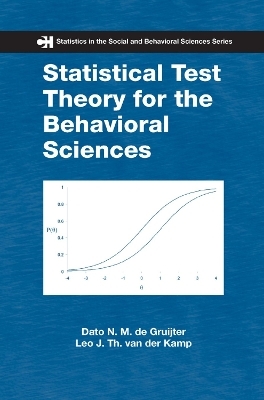
Statistical Test Theory for the Behavioral Sciences
Seiten
2019
Chapman & Hall/CRC (Verlag)
978-0-367-38867-6 (ISBN)
Chapman & Hall/CRC (Verlag)
978-0-367-38867-6 (ISBN)
Since the development of the first intelligence test in the early 20th century, educational and psychological tests have become important measurement techniques to quantify human behavior. Focusing on this ubiquitous yet fruitful area of research, Statistical Test Theoryfor the Behavioral Sciences provides both a broad overview and a critical survey of assorted testing theories and models used in psychology, education, and other behavioral science fields.
Following a logical progression from basic concepts to more advanced topics, the book first explains classical test theory, covering true score, measurement error, and reliability. It then presents generalizability theory, which provides a framework to deal with various aspects of test scores. In addition, the authors discuss the concept of validity in testing, offering a strategy for evidence-based validity. In the two chapters devoted to item response theory (IRT), the book explores item response models, such as the Rasch model, and applications, including computerized adaptive testing (CAT). The last chapter looks at some methods used to equate tests.
Equipped with the essential material found in this book, advanced undergraduate and graduate students in the behavioral sciences as well as researchers involved in measurement and testing will gain valuable insight into the research methodologies and statistical data analyses of behavioral testing.
Following a logical progression from basic concepts to more advanced topics, the book first explains classical test theory, covering true score, measurement error, and reliability. It then presents generalizability theory, which provides a framework to deal with various aspects of test scores. In addition, the authors discuss the concept of validity in testing, offering a strategy for evidence-based validity. In the two chapters devoted to item response theory (IRT), the book explores item response models, such as the Rasch model, and applications, including computerized adaptive testing (CAT). The last chapter looks at some methods used to equate tests.
Equipped with the essential material found in this book, advanced undergraduate and graduate students in the behavioral sciences as well as researchers involved in measurement and testing will gain valuable insight into the research methodologies and statistical data analyses of behavioral testing.
de Gruijter, Dato N. M.; van der Kamp, Leo J. Th.
Preface. Measurement and Scaling. Classical Test Theory. Classical Test Theory and Reliability. Estimating Reliability. Generalizability Theory. Models for Dichotomous Items. Validity and Validation of Tests. Principal Component Analysis, Factor Analysis, and Structural Equation Modeling: A Very Brief Introduction. Item Response Models. Applications of Item Response Theory. Test Equating. Answers. References. Index.
| Erscheinungsdatum | 30.09.2019 |
|---|---|
| Reihe/Serie | Chapman & Hall/CRC Statistics in the Social and Behavioral Sciences |
| Sprache | englisch |
| Maße | 156 x 234 mm |
| Gewicht | 453 g |
| Themenwelt | Geisteswissenschaften ► Psychologie ► Allgemeine Psychologie |
| Mathematik / Informatik ► Mathematik ► Statistik | |
| ISBN-10 | 0-367-38867-7 / 0367388677 |
| ISBN-13 | 978-0-367-38867-6 / 9780367388676 |
| Zustand | Neuware |
| Haben Sie eine Frage zum Produkt? |
Mehr entdecken
aus dem Bereich
aus dem Bereich
wie Affekte innere Entwicklung ermöglichen
Buch | Softcover (2023)
Klett-Cotta (Verlag)
CHF 41,95
Buch | Softcover (2024)
Hogrefe Verlag
CHF 46,50


